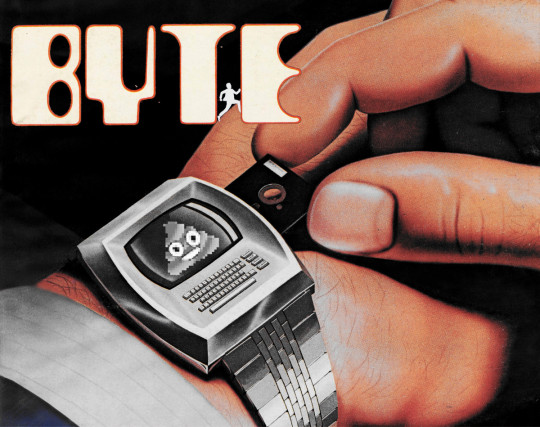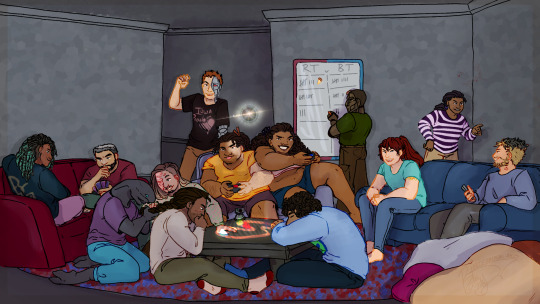#locus red team …..
Explore tagged Tumblr posts
Text
There Were Always Enshittifiers

I'm on a 20+ city book tour for my new novel PICKS AND SHOVELS. Catch me in DC TONIGHT (Mar 4), and in RICHMOND TOMORROW (Mar 5). More tour dates here. Mail-order signed copies from LA's Diesel Books.

My latest Locus column is "There Were Always Enshittifiers." It's a history of personal computing and networked communications that traces the earliest days of the battle for computers as tools of liberation and computers as tools for surveillance, control and extraction:
https://locusmag.com/2025/03/commentary-cory-doctorow-there-were-always-enshittifiers/
The occasion for this piece is the publication of my latest Martin Hench novel, a standalone book set in the early 1980s called "Picks and Shovels":
https://us.macmillan.com/books/9781250865908/picksandshovels
The MacGuffin of Picks and Shovels is a "weird PC" company called Fidelity Computing, owned by a Mormon bishop, a Catholic priest, and an orthodox rabbi. It sounds like the setup for a joke, but the punchline is deadly serious: Fidelity Computing is a pyramid selling cult that preys on the trust and fellowship of faith groups to sell the dreadful Fidelity 3000 PC and its ghastly peripherals.
You see, Fidelity's products are booby-trapped. It's not merely that they ship with programs whose data-files can't be read by apps on any other system – that's just table stakes. Fidelity's got a whole bag of tricks up its sleeve – for example, it deliberately damages a specific sector on every floppy disk it ships. The drivers for its floppy drive initialize any read or write operation by checking to see if that sector can be read. If it can, the computer refuses to recognize the disk. This lets the Reverend Sirs (as Fidelity's owners style themselves) run a racket where they sell these deliberately damaged floppies at a 500% markup, because regular floppies won't work on the systems they lure their parishioners into buying.
Or take the Fidelity printer: it's just a rebadged Okidata ML-80, the workhorse tractor feed printer that led the market for years. But before Fidelity ships this printer to its customers, they fit it with new tractor feed sprockets whose pins are slightly more widely spaced than the standard 0.5" holes on the paper you can buy in any stationery store. That way, Fidelity can force its customers to buy the custom paper that they exclusively peddle – again, at a massive markup.
Needless to say, printing with these wider sprocket holes causes frequent jams and puts a serious strain on the printer's motors, causing them to burn out at a high rate. That's great news – for Fidelity Computing. It means they get to sell you more overpriced paper so you can reprint the jobs ruined by jams, and they can also sell you their high-priced, exclusive repair services when your printer's motors quit.
Perhaps you're thinking, "OK, but I can just buy a normal Okidata printer and use regular, cheap paper, right?" Sorry, the Reverend Sirs are way ahead of you: they've reversed the pinouts on their printers' serial ports, and a normal printer won't be able to talk to your Fidelity 3000.
If all of this sounds familiar, it's because these are the paleolithic ancestors of today's high-tech lock-in scams, from HP's $10,000/gallon ink to Apple and Google's mobile app stores, which cream a 30% commission off of every dollar collected by an app maker. What's more, these ancient, weird misfeatures have their origins in the true history of computing, which was obsessed with making the elusive, copy-proof floppy disk.
This Quixotic enterprise got started in earnest with Bill Gates' notorious 1976 "open letter to hobbyists" in which the young Gates furiously scolds the community of early computer hackers for its scientific ethic of publishing, sharing and improving the code that they all wrote:
https://en.wikipedia.org/wiki/An_Open_Letter_to_Hobbyists
Gates had recently cloned the BASIC programming language for the popular Altair computer. For Gates, his act of copying was part of the legitimate progress of technology, while the copying of his colleagues, who duplicated Gates' Altair BASIC, was a shameless act of piracy, destined to destroy the nascent computing industry:
As the majority of hobbyists must be aware, most of you steal your software. Hardware must be paid for, but software is something to share. Who cares if the people who worked on it get paid?
Needless to say, Gates didn't offer a royalty to John Kemeny and Thomas Kurtz, the programmers who'd invented BASIC at Dartmouth College in 1963. For Gates – and his intellectual progeny – the formula was simple: "When I copy you, that's progress. When you copy me, that's piracy." Every pirate wants to be an admiral.
For would-be ex-pirate admirals, Gates's ideology was seductive. There was just one fly in the ointment: computers operate by copying. The only way a computer can run a program is to copy it into memory – just as the only way your phone can stream a video is to download it to its RAM ("streaming" is a consensus hallucination – every stream is a download, and it has to be, because the internet is a data-transmission network, not a cunning system of tubes and mirrors that can make a picture appear on your screen without transmitting the file that contains that image).
Gripped by this enshittificatory impulse, the computer industry threw itself headfirst into the project of creating copy-proof data, a project about as practical as making water that's not wet. That weird gimmick where Fidelity floppy disks were deliberately damaged at the factory so the OS could distinguish between its expensive disks and the generic ones you bought at the office supply place? It's a lightly fictionalized version of the copy-protection system deployed by Visicalc, a move that was later publicly repudiated by Visicalc co-founder Dan Bricklin, who lamented that it confounded his efforts to preserve his software on modern systems and recover the millions of data-files that Visicalc users created:
http://www.bricklin.com/robfuture.htm
The copy-protection industry ran on equal parts secrecy and overblown sales claims about its products' efficacy. As a result, much of the story of this doomed effort is lost to history. But back in 2017, a redditor called Vadermeer unearthed a key trove of documents from this era, in a Goodwill Outlet store in Seattle:
https://www.reddit.com/r/VintageApple/comments/5vjsow/found_internal_apple_memos_about_copy_protection/
Vaderrmeer find was a Apple Computer binder from 1979, documenting the company's doomed "Software Security from Apple's Friends and Enemies" (SSAFE) project, an effort to make a copy-proof floppy:
https://archive.org/details/AppleSSAFEProject
The SSAFE files are an incredible read. They consist of Apple's best engineers beavering away for days, cooking up a new copy-proof floppy, which they would then hand over to Apple co-founder and legendary hardware wizard Steve Wozniak. Wozniak would then promptly destroy the copy-protection system, usually in a matter of minutes or hours. Wozniak, of course, got the seed capital for Apple by defeating AT&T's security measures, building a "blue box" that let its user make toll-free calls and peddling it around the dorms at Berkeley:
https://512pixels.net/2018/03/woz-blue-box/
Woz has stated that without blue boxes, there would never have been an Apple. Today, Apple leads the charge to restrict how you use your devices, confining you to using its official app store so it can skim a 30% vig off every dollar you spend, and corralling you into using its expensive repair depots, who love to declare your device dead and force you to buy a new one. Every pirate wants to be an admiral!
https://www.vice.com/en/article/tim-cook-to-investors-people-bought-fewer-new-iphones-because-they-repaired-their-old-ones/
Revisiting the early PC years for Picks and Shovels isn't just an excuse to bust out some PC nostalgiacore set-dressing. Picks and Shovels isn't just a face-paced crime thriller: it's a reflection on the enshittificatory impulses that were present at the birth of the modern tech industry.
But there is a nostalgic streak in Picks and Shovels, of course, represented by the other weird PC company in the tale. Computing Freedom is a scrappy PC startup founded by three women who came up as sales managers for Fidelity, before their pangs of conscience caused them to repent of their sins in luring their co-religionists into the Reverend Sirs' trap.
These women – an orthodox lesbian whose family disowned her, a nun who left her order after discovering the liberation theology movement, and a Mormon woman who has quit the church over its opposition to the Equal Rights Amendment – have set about the wozniackian project of reverse-engineering every piece of Fidelity hardware and software, to make compatible products that set Fidelity's caged victims free.
They're making floppies that work with Fidelity drives, and drives that work with Fidelity's floppies. Printers that work with Fidelity computers, and adapters so Fidelity printers will work with other PCs (as well as resprocketing kits to retrofit those printers for standard paper). They're making file converters that allow Fidelity owners to read their data in Visicalc or Lotus 1-2-3, and vice-versa.
In other words, they're engaged in "adversarial interoperability" – hacking their own fire-exits into the burning building that Fidelity has locked its customers inside of:
https://www.eff.org/deeplinks/2019/10/adversarial-interoperability
This was normal, back then! There were so many cool, interoperable products and services around then, from the Bell and Howell "Black Apple" clones:
https://forum.vcfed.org/index.php?threads%2Fbell-howell-apple-ii.64651%2F
to the amazing copy-protection cracking disks that traveled from hand to hand, so the people who shelled out for expensive software delivered on fragile floppies could make backups against the inevitable day that the disks stopped working:
https://en.wikipedia.org/wiki/Bit_nibbler
Those were wild times, when engineers pitted their wits against one another in the spirit of Steve Wozniack and SSAFE. That era came to a close – but not because someone finally figured out how to make data that you couldn't copy. Rather, it ended because an unholy coalition of entertainment and tech industry lobbyists convinced Congress to pass the Digital Millennium Copyright Act in 1998, which made it a felony to "bypass an access control":
https://www.eff.org/deeplinks/2016/07/section-1201-dmca-cannot-pass-constitutional-scrutiny
That's right: at the first hint of competition, the self-described libertarians who insisted that computers would make governments obsolete went running to the government, demanding a state-backed monopoly that would put their rivals in prison for daring to interfere with their business model. Plus ça change: today, their intellectual descendants are demanding that the US government bail out their "anti-state," "independent" cryptocurrency:
https://www.citationneeded.news/issue-78/
In truth, the politics of tech has always contained a faction of "anti-government" millionaires and billionaires who – more than anything – wanted to wield the power of the state, not abolish it. This was true in the mainframe days, when companies like IBM made billions on cushy defense contracts, and it's true today, when the self-described "Technoking" of Tesla has inserted himself into government in order to steer tens of billions' worth of no-bid contracts to his Beltway Bandit companies:
https://www.reuters.com/world/us/lawmakers-question-musk-influence-over-verizon-faa-contract-2025-02-28/
The American state has always had a cozy relationship with its tech sector, seeing it as a way to project American soft power into every corner of the globe. But Big Tech isn't the only – or the most important – US tech export. Far more important is the invisible web of IP laws that ban reverse-engineering, modding, independent repair, and other activities that defend American tech exports from competitors in its trading partners.
Countries that trade with the US were arm-twisted into enacting laws like the DMCA as a condition of free trade with the USA. These laws were wildly unpopular, and had to be crammed through other countries' legislatures:
https://pluralistic.net/2024/11/15/radical-extremists/#sex-pest
That's why Europeans who are appalled by Musk's Nazi salute have to confine their protests to being loudly angry at him, selling off their Teslas, and shining lights on Tesla factories:
https://www.malaymail.com/news/money/2025/01/24/heil-tesla-activists-protest-with-light-projection-on-germany-plant-after-musks-nazi-salute-video/164398
Musk is so attention-hungry that all this is as apt to please him as anger him. You know what would really hurt Musk? Jailbreaking every Tesla in Europe so that all its subscription features – which represent the highest-margin line-item on Tesla's balance-sheet – could be unlocked by any local mechanic for €25. That would really kick Musk in the dongle.
The only problem is that in 2001, the US Trade Rep got the EU to pass the EU Copyright Directive, whose Article 6 bans that kind of reverse-engineering. The European Parliament passed that law because doing so guaranteed tariff-free access for EU goods exported to US markets.
Enter Trump, promising a 25% tariff on European exports.
The EU could retaliate here by imposing tit-for-tat tariffs on US exports to the EU, which would make everything Europeans buy from America 25% more expensive. This is a very weird way to punish the USA.
On the other hand, not that Trump has announced that the terms of US free trade deals are optional (for the US, at least), there's no reason not to delete Article 6 of the EUCD, and all the other laws that prevent European companies from jailbreaking iPhones and making their own App Stores (minus Apple's 30% commission), as well as ad-blockers for Facebook and Instagram's apps (which would zero out EU revenue for Meta), and, of course, jailbreaking tools for Xboxes, Teslas, and every make and model of every American car, so European companies could offer service, parts, apps, and add-ons for them.
When Jeff Bezos launched Amazon, his war-cry was "your margin is my opportunity." US tech companies have built up insane margins based on the IP provisions required in the free trade treaties it signed with the rest of the world.
It's time to delete those IP provisions and throw open domestic competition that attacks the margins that created the fortunes of oligarchs who sat behind Trump on the inauguration dais. It's time to bring back the indomitable hacker spirit that the Bill Gateses of the world have been trying to extinguish since the days of the "open letter to hobbyists." The tech sector built a 10 foot high wall around its business, then the US government convinced the rest of the world to ban four-metre ladders. Lift the ban, unleash the ladders, free the world!
In the same way that futuristic sf is really about the present, Picks and Shovels, an sf novel set in the 1980s, is really about this moment.
I'm on tour with the book now – if you're reading this today (Mar 4) and you're in DC, come see me tonight with Matt Stoller at 6:30PM at the Cleveland Park Library:
https://www.loyaltybookstores.com/picksnshovels
And if you're in Richmond, VA, come down to Fountain Bookshop and catch me with Lee Vinsel tomorrow (Mar 5) at 7:30PM:
https://fountainbookstore.com/events/1795820250305

If you'd like an essay-formatted version of this post to read or share, here's a link to it on pluralistic.net, my surveillance-free, ad-free, tracker-free blog:
https://pluralistic.net/2025/03/04/object-permanence/#picks-and-shovels
#pluralistic#picks and shovels#history#web theory#marty hench#martin hench#red team blues#locus magazine#drm#letter to computer hobbyists#bill gates#computer lib#science fiction#crime fiction#detective fiction
495 notes
·
View notes
Text






have i mentioned that i’m a red team locus truther
(this is old art. earliest is from 2020)
#locus red team …..#locus is so transgender to me btw … in a she/they/he way#i like logrif mostly platonically but i think it’s funny if grif and simmons r both like yeah. locus is attractive.#then they both decide to do absolutely nothing about that information and mutual understanding.#anyways logrif besties yipeee! grif and locus besties !!!#i mean grif and simmons r best friends also but in a different way. there is something wrong with them (romantically)#grif and locus i have a few thoughts on how their friendship could be. i won’t get into it rn there isn’t enough room here#rvb#red vs blue#dexter grif#grimmons#dick simmons#my art#richard simmons#rvb locus#samuel ortez
862 notes
·
View notes
Text

GAME NIGHT
Last week's loser has to pay for this week's pizza, this week's loser has to pay for next week's pizza
#rvb#red vs blue#buckle in kids i have so many tags to ping#rvb tucker#rvb sarge#rvb junior#rvb donut#rvb locus#rvb caboose#rvb washington#rvb wash#rvb agent washington#rvb carolina#rvb agent carolina#rvb kai#rvb sister#rvb grif#rvb simmons#rvb huggins#rvb lopez#rvb doc#my art#batsy art#my head says include their alt tags but honestly i dont think i will fuck it#this has been pinging around since i finished the blue team bonding night i just havent had spoons for it til now#ENJOY THEM BC I SURE DO#donut teaching junior how to braid using locus is i think my personal fave but im biased#also it was ridiculously hard to find a transparent lens flare for huggins i had to cheese it w my own rings!! bonkers#carolina isnt allowed to play the competitive games#coop yes
400 notes
·
View notes
Text
The reason red team Locus works so well is because he's like what Church was in the early seasons, the guy going what the fuck along with you but not actually trying that hard to stop anything. He's the perfect straight man for the reds in a way red team Carolina can't be because he has practically no authority over them and she does. She's just a tad bit too serious for the reds and they need their creative juices to flow even if the Warthog is set on fire in the process. But Locus is the person who stands there in a daze as the reds just hand him things to hold for their schemes having no clue how he even got there in the first place. He goes along with the plan and hopes he can at least stop someone from dying or getting horribly wounded and that's all the matters
Also the reds just need their weird little guy and he fulfills that perfectly thanks
#Inspired by major-comets recent post you have no idea how much I adore red team locus#This is a fraction of my thoughts on it he just works so well with them#probably explained this horribly but I also don't care#insert that one emoji smile thing that has both thumbs up#red vs blue#rvb#rooster teeth#rvb locus#samuel ortez#rvb carolina
198 notes
·
View notes
Text
part of what’s so fun to explore about the reds and blues in the realm of headcanons and fanworks is the fact that i wholeheartedly believe that they’re bound by the laws of comedy in the sense that they have the capacity to forgive absolutely anyone and bring them into the fold if it would be funny enough to do so.
bringing locus into the fold after season 15? objectively funny. the reds are gonna force him into domesticity if they die trying. sarge is gonna make him sit on the couch and watch top gun while donut paints his nails and grif de-tangles his hair, and he's gonna like it, damnit
the freelancers come back from the dead and need a couch or two or five to crash on? ehh who cares that wyoming and maine tried to kill them - so did wash, and look at him now!
the reds and blues should rehab former antagonists like they're rescue dogs that just need to be re-socialized
#“what about felix” look i have to draw a line somewhere or else tucker will have a cardiac event#comet posting#rvb#red vs blue#rvb locus#samuel ortez#rvb sarge#dexter grif#rvb red team
276 notes
·
View notes
Text

MLP AU for the last day of @donutweek!
Base by MagicalBases and Orin331 on Deviantart
#donutweek24#I haven't draw MLP in AGES but its a mlp fan urge to ponify everything#rvb simmons#rvb donut#rvb grif#rvb sarge#rvb lopez#rvb locus#rvb red team#I want yall to know Lopez has no cutie mark#mlp-fied#rvb#will I ponify blue team? Not for a while sorry#my art
123 notes
·
View notes
Text
73 notes
·
View notes
Text
I think joining red team would fix Locus
32 notes
·
View notes
Text
IT'S OFFICIALLY 2024 AT MY AREA!!! HAPPY NEW YEARS EVERYONE


(Someone definitely messed up some fireworks at blue base, tryin' to guess who's the culprit)
#red vs blue#rvb#2024#HAPPY NEW YEARS!!!#Rvb Red team#Rvb Blue team#locus is there lol#I still have drawings of others but wanted to post these two first
148 notes
·
View notes
Text









rvb ft. goofs and gags pt. 3
#this one’s a little all over the place sorry team#also im gonna put these in one tag so they can all be found together just like give me a min#rvb#red vs blue#felix#locus#isaac gates#samuel ortez#agent york#agent carolina#sigma#the meta#agent maine#rvb doc#frank dufresne#tucker#lavernius tucker#rvb church#epsilon#yorkalina#chex#agent texas#carwash#washlina#agent washington#sucker#tucksis#??? do they even have a ship name lmao#tucker/sister#rvb goofs and gags
373 notes
·
View notes
Text

Red Team presentation night
#rvb#red vs blue#rvb locus#locus#samuel ortez#locus is wearing the red team custom crop top#donut made it for him#he also put himself there because self love is important#take this shitpost ouut fo my hands
47 notes
·
View notes
Text
rvb au where everything is the same but the soldiers on chorus all wear odst armor
#ideally they'd be in marine armor so felix locus and the pirates could be in odst armor but the limitations of machinima#or felix and locus could keep their armor but it's gotta be a plot point that it's reverse engineered pfl armor#which in turn can act as a plot point for the bgc + wash to be sus of felix instead of whatever they did in s11 bc that was lowkey semi ooc#as I've mentioned somewhere in a past post#like i get it the guys were stranded and desperate and lina and epsilon were mia but they weren't THAT bad off#or blue team wasn't at least since wash was being petty af and didn't bother to tell the reds that he hooked blue base up to the ships power#also tucker and caboose being in on it would be so funny#wash: im not going to hook up the reds for.....reasons#tuck and boose: lol okay. fuck those guys! (affectionate)#rvb#red vs blue#will maybe rb this later w some art examples but atm I've gotta go out and garden and mulch the raised beds while it's not 85°f+ and humid#bc lemme tell yall the summer is brutal. i hate going to water the garden when it's so hot out
31 notes
·
View notes
Text
Since the shisno trilogy has been retconned can i just say i never actually believed in Locus redemption
#rvb#like I get it ?? its a fun dynamic he and grif were funny#but i could never get over the fact he enacted genocide. ON CHILDREN#Manipulated or not. in the end Lopez STILL didn't take accountability for his actions#I get that rvb is very anti-incarceration and they didn't believe locus could redeem himself in jail#the same way Wash wouldn't have been able to#but the only difference in felix and locus is that Locus changed his mind last second so he didn't deserve to die like felix?? idk#Sorry red team Locus fans i just think he's way more fascinating as a villian#i cannot grapple w the heroes of chorus being buddy buddy w the guy that helped kill off half the planet
19 notes
·
View notes
Text

Movie night is a vital part of the Red Team experience
plus an honorary Doc to make the snack runs
#rvb#rvb donut#rvb locus#rvb sarge#rvb grif#rvb simmons#rvb doc#rvb lopez#my art#batsy art#samuel ‘locus’ ortez#franklin delano donut#lopez the heavy#frank 'doc' dufrense#dexter grif#dick simmons#rvb red team#red vs blue#i have no idea what theyre watching but everyone is very invested#except lopez who is reading locus' book over his shoulder#locus is pretending to read bc he's definitely not getting dragged into the joy of watching a movie with your found family no sirree not hi#this is a lie and lopez will call him out on it.. another night#for now they vibe#docs spot is directly in front of donut bc donut is playing with his hair during the 'boring' parts#grif and simmons have claimed the 'neutral' mini-couch for their own#the blues are having their own team bonding night which is 'camping' in the yard#enrichment for everyone on team night#donut and simmons being the most invested after sarge felt like the only viable option here#sarge is yelling at the screen bc u cannot convince me he wouldnt be that guy who calls the mc an idiot for not talking to their team#hi pot calling the kettle black but when is the man ever that aware of himself
356 notes
·
View notes
Text
To expand on a previous post
#ALSO I PASSED MY TEST 😝😝😝#once again on the cusp#I literally got the lowest grade you could get without failing#I wish I was joking my math teacher was IMPRESSED by it 😭😭😭#Had me high five him and everything 😔✊#red vs blue#rvb#rooster teeth#edit#rvb donut#rvb sarge#rvb locus#rvb grif#rvb simmons#rvb lopez#rvb red team
115 notes
·
View notes
Text
to start off strong, and to give me more motivation to write, i’m opening my asks for requests!!! please feel free to request certain characters or prompts, whatever you’d like!!
here’s a list of some dialogue i’m up for putting into my work!! but you can always request more than whats put here!!!🫀
[angst]
1: “i wish you never had trusted me.”
2: “i guess this is a lesson in not trusting people, right?”
3: “none of it was real, but i wish it was.”
4: “from the day we met, i knew i’d hurt you eventually.”
5: “i told you not to get too close to me.”
6: “i never loved you.”
7: “what was going through your head when i told you i loved you?”
8: “say you never loved me, say it.”
9: “what are you going to do, shoot me? do it.”
10: “don’t make me kill you.”
[hurt/comfort]
11: “you are what’s important right now.”
12: “i don’t have anyone anymore.” “ you have me.”
13: “it’s okay, you know. if you need to vent.”
14: “please don’t go.”
15: “why didn’t you tell me the nightmares were back? you know i never minded helping with them.”
16: “you know my door is always open to you.”
17: “you shouldn’t smoke, you know.”
18: “you shouldn’t be out here by yourself.”
19: “you’re not as bad as everyone says you are.”
20: “i just thought you’d like some company.”
[fluff/humor]
21: “are you jealous? want me all to yourself, do you?”
22: “i don’t think i’ve ever seen you smile.”
23: “i knew you had a heart.”
24: “would it be too cliche if we matched armor?”
25: “quit smiling at me, you’re making me mess up.”
26: “i’m trying my absolute hardest to see things from your perspective, but i just can’t get my head that far up my ass.”
27: “i don’t have enough middle fingers to let you know how i feel.”
28: “i turned out liking you a lot more than i originally planned.”
29: “don’t look in her eyes, she might steal your soul.”
30: “i just lied to a guard, am i badass or what?”
aanddd there we go!! as of right now i’m open to all characters, but i cannot promise they will all be romantic! if i don’t feel confident enough writing for them, i’ll just make it platonic!
also i see other writers do this, where people have their own anons! if you’d like to be one, do your thing!
ask away! 🫀
#rvb blue team#rvb red team#rvb x reader#red vs blue#rvb locus#rvb felix#rvb wash#x reader#writing prompt#prompt list#dialogue prompt
32 notes
·
View notes